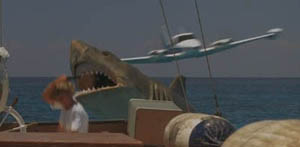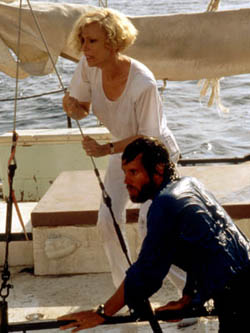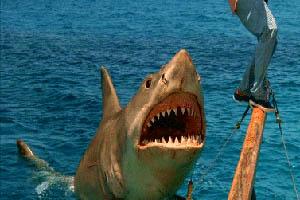|
Sometimes, you wonder just how something like this can happen: how is it possible that a film series that began with what is considered to be an all-time classic eventually devolves to include such an incompetently-mounted waste of celluloid? Then you realize it: the director, producers, writers, and actors, save for one supporting role, who brought us the original Jaws had shit all to do with this catastrophe, and the simple motive of expected returns explains all else. 
A few days before Christmas, Sean Brody, youngest son in the original film and now a police officer following in his father's footsteps, gets a call to deal with a tangled buoy and is eaten when a great white shark pops up out of the water like an unholy Jack-in-the-box and chomps off his arm. Foolishly peering over the edge of the boat after this has happened, he quickly finds the rest of his body following suit. Let me just say, for the record, that I hate it when films in a series take a totally off-the-cuff attitude towards killing characters whose fates formed much of the drama of prior installments. Much like the unforgivably pointless killing of Newt at the start of Alien 3, this totally offhand killing of Sean Brody makes all of the dramatic tension of the climax of Jaws 2 pretty moot. Ellen Brody, (Lorraine Gary, the single returning cast member) consumed with grief, heads down to the Bahamas to be with elder son Michael, now a marine biologist. She wants him to give up his career, worrying he'll share the same fate. He argues, rationally, that great white sharks aren't native to the area. The script argues back, far less rationally, that they can hang about down south if they bloody well feel like it, and sends the killer shark down in pursuit. Read that again, and see if your brain doesn't throw up on itself: in pursuit. 
Sometime in between films, Chief Martin Brody has died offscreen, presumably because Roy Scheider had too much class and intelligence to be caught within ten miles of this putrefying bag of vomit. He died of a heart attack, but Ellen argues that there was more to it. The heart attack was brought on by fear, "Fear of that shark." There's so much wrong with that simple statement I scarcely know where to start. Where did this fear come from? The original shark was killed, and Brody faced and overcame his fear of the water. By part two, he's obviously at ease out on the ocean, and hardly flinches when killing the shark threatening his son. He's frankly become something of a shark-dispatching badass. When did this heart attack-inducing terror occur? And what does she mean by "that shark?" What shark? One of the two he faced and defeated, or some other shark who dropped by one day disguised as an Amway salesman and yelled "Boo!" at the police chief before slipping off back to the water where he would lie in wait for the son, whose career the shark had apparently followed with interest? Later in the film, this will be reiterated as simple fact, in reference to "the shark that killed Sean and Martin," a claim that starts to really bring out the most ridiculous of all possible subtexts: that it has been the same shark in each film, despite the fact that it meets its maker at the end of all of them. Is that really what they're thinking here? Perhaps all sharks share one singular shark soul, and function as a group mind. At any rate, to take this heart attack scenario seriously makes the film guilty not only of trampling on the end of the only decent sequel, but of rendering the original film superfluous by stating that Brody never did successfully defeat his fears. Excuse me, but please go fuck yourself, movie. The alternative, sadly, is no better: that some other shark, who had kept track of the Brody family's exploits via the local shark newspaper or some such thing, decided to avenge its fellow fish, a shark capable of tracking human movements on land and able to identify and recognize individuals it has never seen based simply on their roles in the story, no less. Ellen Brody seems possessed of similar abilities, as at multiple points she has sepia-toned flashbacks of events she never witnessed, as well as apparently sensing the shark's first attempt on Michael's life. No matter how you interpret it, you're left with an explanation that might as well have been announced by having the director write "It's just fucking magic" on a sign and wave it at the camera. If you thought that the Jaws series could've gotten along just dandy without a lot of psychic mumbo-jumbo, well, you're not only correct, but probably better qualified to have made this film than the people who actually did so. 
Jaws director Steven Spielberg would later candidly admit that the extremely effective technique of showing the shark mostly in fleeting glimpses was due less to artistic choice than to a particularly uncooperative shark prop. This lesson having long since been learned, however, one is loath to understand why Jaws: The Revenge director Joseph Sargent continually shows the shark listlessly drifing along in straight lines on sometimes visible tracks and guide rods, evoking about as much menace as a reasonable scary piece of driftwood. The human players don't fare much better. In stark contrast to the first film's excellent triumverate of Brody, Hooper, and Quint, none of the characters here make much lasting impression, with the possible exception of Michael Caine's pilot, whose reaction to the approaching shark is so hilarious it almost saves the movie. You know, for the five or so seconds the scene is happening. Nothing could save the picture as a whole short of a disastrous warehouse fire breaking out wherever the prints were stored. Of course, depending upon which cut you see, the shark might or might not explode when impaled at the finale, and Mario van Peebles's character might or might not live. These, apparently, were the issues the studio felt would be the tipping points of the film's success. Considering the fact that the film contained a mind-reading magic shark, which wasn't up for reconsideration or revision, one can see just how deeply the filmmakers were detached from reality. The original ad line for this film was the now-infamous "This time, it's personal." Had the screenwriter remembered a scene from Jaws 2 wherein a marine biologist tells Chief Brody, "Sharks don't take things personally," we might have been spared this entire debacle. -review by Matt Murray
|
|
||||||||